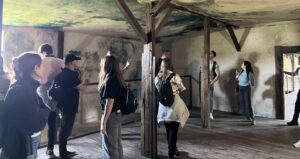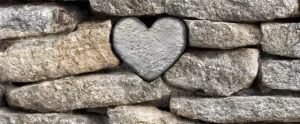Second to saving the world at Calvary, I think that the Passover miracle is God’s favorite. He talks about it often in Scripture, and made Passover month the beginning of the whole year (Exodus 12:2). He even defines Himself by the event: At the beginning of the ten commandments He introduces Himself like this: “I am the LORD your God, who brought you out of Egypt, out of the land of slavery”.
He used to call Himself “The God of Abraham Isaac and Jacob”, or “I AM” up to this point… But “The One who brought you out of Egypt” is what He calls Himself repeatedly from the Exodus onwards, literally hundreds of times. God is passionate about the whole Passover saga, and the more we dig into the story, the more we discover that it’s full of rich beauty, meaning and power…
The Passover miracle is recalled with wonder throughout many of the Psalms, and although many Jewish people see Sinai as the defining moment of the Old Testament, I would venture to say that God sees the Passover as the cornerstone of the story of Israel. As will be explained below, it is the moment in history when the Jewish race became the Jewish faith. Plus, it is a huge neon sign pointing to the coming release which would be bought with the blood of another spotless lamb – our Savior Jesus.
The God of Freedom
I love the fact that our God is all about freedom; He freely gave everyone freedom to choose at every stage in the Passover story described in the book of Exodus. Even though He famously hardened Pharaoh’s heart, it was after some serious choices on Pharaoh’s part to harden his own heart first.1 God just consolidated his free choice.
He also gave freedom to His people, Israel, about whether to go along with the plan or not. They were not rescued from the Angel of Death by force—He gave an “opt in” clause: to have death pass over your house, you must sacrifice a lamb and daub its blood on your doorframe. This was an act of faith. It was an active response to a command of God, which had a promise… and all who believed it was true and acted accordingly were saved. That means that those who escaped from Egypt had freely chosen to obey God and follow Him by faith—not just because of their ancestry.
This is the moment that the people of Israel became a faith community.
As we mentioned, the ten commandments are introduced by God’s reminder that He loves to set slaves free, and the very first command when He subsequently lays down the rest of the Torah is this:
“These are the laws you are to set before them: If you buy a Hebrew servant, he is to serve you for six years. But in the seventh year, he shall go free, without paying anything.” (Exodus 21:1-2).
What a strange subject with which to start a new code of government, spiritual life and ethics! But God is determined that His people should not be in slavery—they should be free. This is the message of Passover. That is what the exodus was all about. God is serious about making His people free.
God-Appointed Memory Aids
Remembering is very important to God. He jogs our memory all the time in the Bible, urging us, “Remember!” I think one of Satan’s best strategies is dimming our memory. If we remember what God has done, what He has said and who He is, we can have faith in Him today and trust for tomorrow. The opposite is often true as well. The Passover Seder meal is a multi-sensory teaching experience, instituted by God Himself, in order to prevent the people from forgetting. It involves sight, smell, taste and touch, and was designed to teach generation after generation the amazing story, and to keep it alive in the Jewish collective memory.
Today the family celebration is based around four cups of wine and a “haggadah” or “telling” which is like an order of service. There are different ideas about what each of the four cups represents, but generally the first cup is about sanctification, and being set apart for God, the second is the time to tell the story, the third is drunk after the meal, when Jewish people usually say grace for their food, and the last one is “hallel” or praise, after the songs and Psalms of thanksgiving.
Each item of food on the table symbolizes something in the story—the dry, unleavened matzah bread represents the dryness of slavery, in contrast with the richness and blessing of wine, which represents freedom. It is also commonly believed that yeast represents sin, and that this is a time to do away with all yeast, and all sin. The bitterness of the bitter herbs speak of the suffering, and so on. Each aspect of the evening helps the Jewish people to remember the miracles God did for them and even to re-live them. It is not so much about recalling some historical event lost in the sands of time, as actually re-living the story and making it part of life today… and hope for the future.
It was this very Passover seder that was the last supper that Yeshua ate with His disciples, in the traditional Jewish way (read more about the first Passover). It was unleavened, passover bread that He broke, when he told His disciples to “do this in remembrance of me”, and it was one of the four cups of wine that He drank when he spoke of it representing His blood. We drink it to remember the blood that bought our freedom, and caused death to “pass over” us as well. He is in every way the embodiment and fulfillment of the Passover story. And we will remember what He did for us each time we eat the bread and drink the cup.
Passover: The Four Stages of Liberation
“I have heard the groaning of the Israelites, whom the Egyptians are enslaving, and I have remembered my covenant. Therefore, say to the Israelites:
‘I am the LORD, and
– I will bring you out from under the yoke of the Egyptians.
– I will free you from being slaves to them, and
– I will redeem you with an outstretched arm and with mighty acts of judgment.
– I will take you as my own people, and I will be your God.
Then you will know that I am the LORD your God, who brought you out from under the yoke of the Egyptians.” (Exodus 6:5-7)
Jewish tradition states that the four cups represent the four aspects of redemption listed in these verses from Exodus:
1. I will bring you out from under the yoke of the Egyptians
This is the first stage of liberation—the practical and actual rescue from captivity. It is the physical transition out of Egypt and towards the Promised Land. As believers, we can see that when Yeshua paid for our sin on the cross, we were made free from condemnation, and can start our journey of a life walking with God. The fact that the Jewish people went through water might also parallel the believer’s baptism as part of the liberation process.
2. I will free you from being slaves to them
This second stage is more about mental liberation. Even when freed, humans and animals can sometimes still act as if they are not. Sometimes this is called institutionalisation. We get so used to living in a cage, we don’t know how to walk in freedom. Here, God promises to free Israel of the slave mindset, and we too need to be liberated from a mind that has been in bondage to sin. We need to understand more and more that we really are free, and learn how to live accordingly.
3. I will redeem you with an outstretched arm and with mighty acts of judgement
The Exodus story is full of the supernatural. I often wonder if these miracles happened today what we might think… are we willing to accept God in all His supernatural wonder? His mighty outstretched arm? Some of the miracles and judgments are hard to accept—especially when seen from the perspective of the ordinary Egyptian. This is our God: mighty in wonders, unfathomable, unstoppable, and unlike anything we could possibly understand. But this is our rescuer. He wants us to embrace Him and His redemption, and let Him decide how things must be done.
4. I will take you as my own people, and I will be your God
The ultimate goal is relationship. God wants intimacy with His people. The desert can be seen to represent walking in intimacy with God, and in fact God looks back at that time right after the exodus as something of a honeymoon with His people:
“This is what the LORD says:“‘I remember the devotion of your youth, how as a bride you loved me and followed me through the wilderness, through a land not sown. Israel was holy to the LORD, the firstfruits of His harvest”. Jeremiah 2:1-3
“Therefore I am now going to allure her; I will lead her into the wilderness and speak tenderly to her. There I will give her back her vineyards, and will make the Valley of Achor a door of hope. There she will respond as in the days of her youth, as in the day she came up out of Egypt.” Hosea 2:14-15 2
A pastor once said, “a dessert is something you want and don’t need, but the desert is something you don’t want, but you do need”. Desert life is not easy, but it’s often where our walk with God gets deeper and more intimate. One day we will be in the promised place of ultimate rest but until then, life with God is not always going to be a walk in the park. It’s a time to learn about our rescuer, and grow in our ability and willingness to trust, love and follow Him. We are with Him, and He is with us. We are His people, and He is our God. We are bonded in relationship, and that is our joy and His.
Jesus our Passover lamb: more Glorious Stories To Come!
So while this is just the very tip of the iceberg when thinking about the Passover story and its fulfillment in Yeshua our Messiah, it’s easy to see why this event is so pivotal, and such a perfect foreshadowing of our salvation story. God reminds Israel of who He is and what He’s done for them over and over again by adding the events to His name: “You know, me—the one who brought you out of Egypt”… And like all of us, the Israelites needed a lot of reminding. But Jeremiah writes something curious about this description of God:
“The days are coming,” declares the LORD, “when it will no longer be said, ‘As surely as the LORD lives, who brought the Israelites up out of Egypt,’ but it will be said, ‘As surely as the LORD lives, who brought the Israelites up out of the land of the north and out of all the countries where He had banished them.’ For I will restore them to the land I gave their ancestors.” Jeremiah 16:14-16 (23:7-8 says much the same thing).
The story of God and the Israelites is not over yet. God has indeed brought the Israelites out from the land of the north (Russia and surrounding area) and out of all the countries they had been banished to for almost two thousand years. He is still not widely known by name for this action. But the days are coming…
The physical, practical and actual restoration of Israel took place last century. Now we prayerfully anticipate and work towards the spiritual restoration of Israel.
Happy Passover, and God’s richest blessings to you as we celebrate the resurrection of our sacrificial Passover Lamb that bought our freedom.
[1] Pharaoh hardens his own heart by his free choice on two occasions (Exodus 8:15, 8:32) before God hardens his heart (Exodus 9:12). Then Pharaoh once again freely chooses again to harden his own heart, along with his officials (9:34). After that God hardens his heart four more times, so that His glory can be seen (10:1, 20, 27, 11:10, 14:8)
[2] The picture of sitting under your own vine is a Biblical image of freedom, rest and peace (Micah 4:4 and Zechariah 3:10).
















